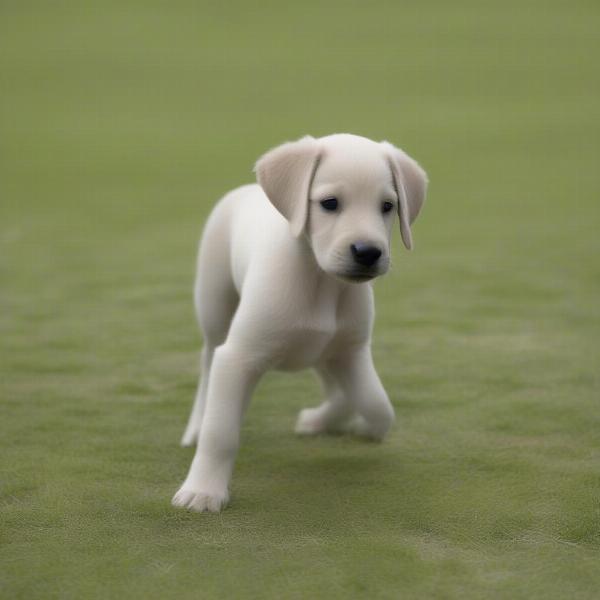Bow legged hind legs in dogs, also known as genu varum, can be a concerning sight for pet owners. This condition, where the dog’s hocks turn inwards and the feet turn outwards, can range from a mild cosmetic issue to a serious mobility problem. Understanding the causes, diagnosis, and treatment options for bow legs in dogs is crucial for providing the best possible care for your furry friend.
Understanding Bow Legs in Dogs
Bow legs can develop in puppies or adult dogs, and the underlying causes vary. In puppies, nutritional deficiencies, particularly a lack of calcium and phosphorus, can lead to weakened bones and abnormal growth, resulting in bowed legs. Genetic predisposition also plays a role, with some breeds being more prone to this condition. In adult dogs, injuries, arthritis, and other joint problems can contribute to the development of bow legs. Identifying the root cause is essential for effective treatment.
 Puppy with Bowed Legs
Puppy with Bowed Legs
Diagnosing Bow Legs
If you notice your dog’s hind legs appearing bowed, consult a veterinarian for a proper diagnosis. The veterinarian will perform a physical examination, assessing the dog’s gait and range of motion. X-rays are often necessary to evaluate the bone structure and identify any underlying joint issues or deformities. In some cases, further diagnostic tests may be recommended to rule out other conditions. Early diagnosis is key to managing bow legs effectively and preventing further complications.
Treatment Options for Bow Legs
The appropriate treatment for bow legs in dogs depends on the underlying cause and the severity of the condition. In puppies, dietary adjustments and nutritional supplements can often correct mild cases caused by nutritional deficiencies. Braces or splints may be used to support the legs and promote proper alignment. In more severe cases, or in adult dogs with underlying joint problems, surgery may be necessary to correct the deformity or alleviate pain.
Managing Bow Legs and Ensuring Comfort
Regardless of the chosen treatment, managing bow legs effectively involves ongoing care and monitoring. Regular veterinary check-ups are essential to track the dog’s progress and adjust the treatment plan as needed. Physical therapy and controlled exercise can help strengthen the leg muscles and improve mobility. Pain management is also crucial, especially for adult dogs with arthritis or joint pain. Providing a comfortable and supportive environment can significantly improve your dog’s quality of life.
What are the common signs of bow legs in dogs?
Besides the noticeable bowing of the hind legs, other signs can include difficulty walking or running, lameness, and pain.
Can bow legs be prevented in dogs?
Providing a balanced diet rich in calcium and phosphorus during puppyhood is crucial for proper bone development. Choosing reputable breeders who screen for genetic predispositions can also help reduce the risk.
When should I seek veterinary attention for my dog’s bow legs?
If you notice any bowing of your dog’s hind legs, consult a veterinarian as soon as possible. Early diagnosis and intervention can significantly improve the outcome.
Are there any long-term health concerns associated with bow legs?
Untreated bow legs can lead to arthritis, joint pain, and mobility issues in the long run.
What is the prognosis for dogs with bow legs?
The prognosis depends on the underlying cause and the severity of the condition. With proper treatment and management, many dogs can live comfortable and active lives.
Further Reading
For further information on dog-friendly locations in the UK, you might find these articles helpful:
- dog friendly london
- dog friendly cruises uk
- dog friendly pubs anglesey
- dog friendly hotels in northumberland
About ILM Dog
ILM Dog is your trusted source for comprehensive information on dog care, offering expert advice on everything from breed selection and health to training and nutrition. We connect dog owners with valuable resources and insights to ensure the well-being of their canine companions. Whether you’re a seasoned dog owner or just starting out, ILM Dog provides practical guidance and expert tips to help you navigate the joys and challenges of dog ownership. For all your dog-related inquiries, contact us at [email protected] or call +44 20-3965-8624.